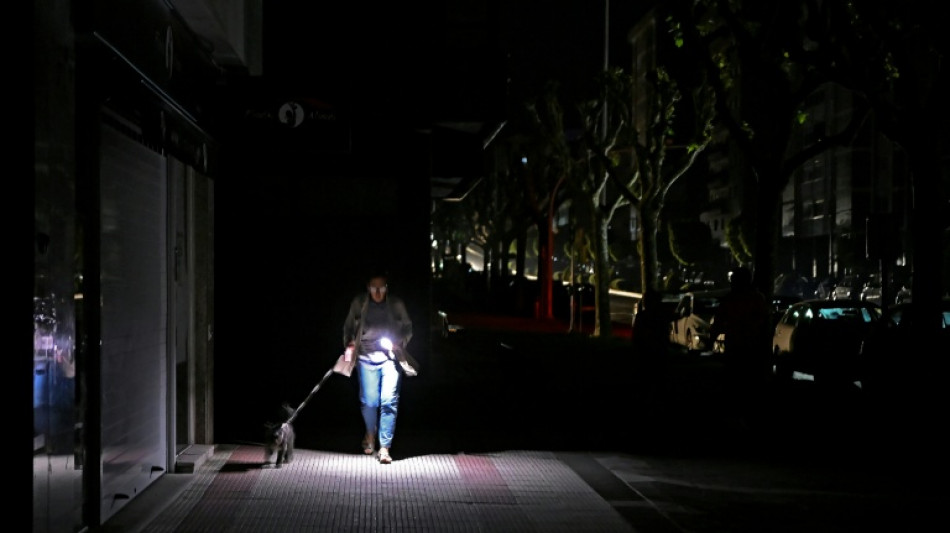
-
 First wolf-dog hybrid confirmed in Greece
First wolf-dog hybrid confirmed in Greece
-
Postecoglou has faith Forest will turn corner after sack chants

-
 Arsenal must find next level to win trophies: Arteta
Arsenal must find next level to win trophies: Arteta
-
Trump gives Hamas until 2200 GMT Sunday to agree to Gaza deal

-
 UK police 'may' have shot victim killed in synagogue attack
UK police 'may' have shot victim killed in synagogue attack
-
Piastri sets pace in chaotic Singapore second practice

-
 Future king Prince William says 'change on agenda'
Future king Prince William says 'change on agenda'
-
Man Utd need action, not words: Amorim

-
 Italy-Libya migration pact under scrutiny as bullets fly
Italy-Libya migration pact under scrutiny as bullets fly
-
Antony felt 'lack of respect' during Man Utd exit

-
 Horner 'ringing up every team owner' as he plots F1 return
Horner 'ringing up every team owner' as he plots F1 return
-
'Suffering' Djokovic battles past Cilic in Shanghai opener
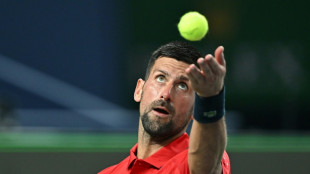
-
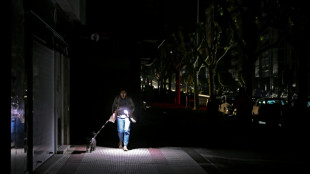 'First of its kind' power surge behind Iberia blackout: experts
'First of its kind' power surge behind Iberia blackout: experts
-
South Africa's Kolisi wary of Argentina 'fight' in Rugby Championship finale

-
 Men killed in UK synagogue attack were known for generosity, jokes
Men killed in UK synagogue attack were known for generosity, jokes
-
US delays key jobs report due to government shutdown
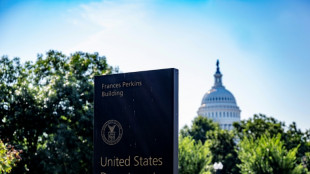
-
 US government shutdown seen dragging into next week
US government shutdown seen dragging into next week
-
England thrash South Africa by 10 wickets at Women's World Cup

-
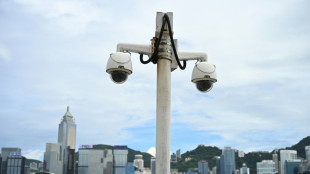 Hong Kong to install surveillance cameras with AI facial recognition
Hong Kong to install surveillance cameras with AI facial recognition
-
Spain coach dismisses spat with Flick over Yamal injury

-
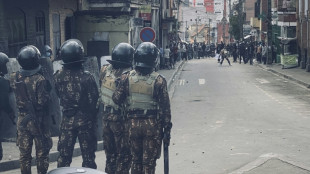 Madagascar's president denounces 'coup' attempt in day of fresh protests
Madagascar's president denounces 'coup' attempt in day of fresh protests
-
'Suffering' Djokovic fights past Cilic in Shanghai opener
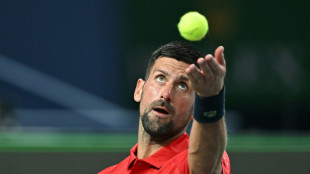
-
 Pegula fights past Navarro for Noskova semi-final in Beijing
Pegula fights past Navarro for Noskova semi-final in Beijing
-
UK on 'high alert' following synagogue attack

-
 Israel deports first activists from Gaza aid flotilla
Israel deports first activists from Gaza aid flotilla
-
Bellingham's omission from England squad nothing personal, says Tuchel

-
 Luxembourg enthrones new grand duke after royal abdication
Luxembourg enthrones new grand duke after royal abdication
-
England skittle sorry South Africa for 69 at Women's World Cup

-
 Jurel, Jadeja tons put India in firm command of West Indies Test
Jurel, Jadeja tons put India in firm command of West Indies Test
-
UN-backed climate banking alliance ceases operations

-
 Stocks gain on AI optimism, US rate-cut hopes
Stocks gain on AI optimism, US rate-cut hopes
-
France captain Dupont bemoans 'restrictive' Top 14 salary cap

-
 Maresca denies Chelsea 'discipline problem' after spate of red cards
Maresca denies Chelsea 'discipline problem' after spate of red cards
-
Aston Martin's Alonso quickest in first practice for Singapore GP

-
 EU-member Luxembourg enthrones monarch, drawing hundreds
EU-member Luxembourg enthrones monarch, drawing hundreds
-
Bellingham left out of England squad for October games

-
 Sarah Mullally appointed first woman to lead Church of England
Sarah Mullally appointed first woman to lead Church of England
-
Carrefour name disappears from Arab stores as Israel boycotters claim victory

-
 Brignone will give her all to be ready for Winter Olympics
Brignone will give her all to be ready for Winter Olympics
-
Organisers say last Gaza flotilla boat intercepted by Israel

-
 Jurel, Jadeja power India's lead to 164 against West Indies
Jurel, Jadeja power India's lead to 164 against West Indies
-
Philippine military chief says rejected calls to oust Marcos

-
 Hamas says still needs time to study Trump's Gaza plan
Hamas says still needs time to study Trump's Gaza plan
-
World champion Marquez crashes twice in Indonesia MotoGP practice

-
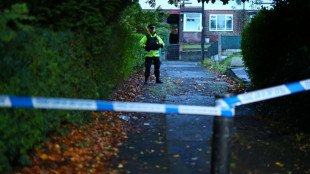 UK on 'high alert' following synagogue terror attack
UK on 'high alert' following synagogue terror attack
-
Finland dismisses case over Baltic cable cuts

-
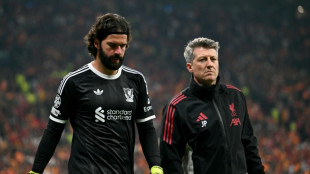 Liverpool goalkeeper Alisson ruled out until after international break
Liverpool goalkeeper Alisson ruled out until after international break
-
Russia-linked tanker stopped by France resumes voyage: vessel trackers

-
 Hamas official says group still needs time to study Trump's Gaza plan
Hamas official says group still needs time to study Trump's Gaza plan
-
Goffin beats Shelton in first Shanghai Masters shock


'First of its kind' power surge behind Iberia blackout: experts
A power surge that caused a paralysing blackout across all of Spain and Portugal in April was an unprecedented event in Europe and possibly the world, but the root cause remains unknown, an expert panel said Friday.
"This was the most severe blackout incident in Europe in the last 20 years," Damian Cortinas, president of the association of electricity grid operators ENTSO-E, said during a presentation of the panel's preliminary report into the incident.
He said "cascading overvoltages" were behind the blackout, which he called a "first of its kind" on the continent.
Cortinas added that "we think (it is unprecedented) in the world as well", but cautioned that the experts did not have information from every country.
The April 28 outage cut internet and telephone connections, halted trains, shut businesses and plunged cities into darkness across Spain and Portugal. It also briefly affected southwestern France.
A Spanish government report had previously blamed the massive outage on overvoltage in June.
Overvoltage occurs when there is too much electrical voltage in a network, overloading equipment. It can be caused by surges in networks due to oversupply or lightning strikes, or when protective equipment is insufficient or fails.
- 'New territory' -
Friday's "factual" report, produced by a panel of 45 European experts mandated to carry out technical investigations, describes the sequence of events that led to the uncontrolled, widespread outage.
But it does not yet provide the primary causes of the initial incidents.
"This is new territory. This is also why we need a bit of time to be sure that we analyse what's going on and what would happen," Cortinas said.
The expert group will publish its final report in the first quarter of 2026, ENTSO-E said in a statement
"It will include a detailed root cause analysis and recommendations on how to prevent similar events happening across the European power system in the future," it added.
The factual report was based on a massive quantity of data, which took a lot of time to collect as experts from power generators and their users as well as third parties.
Some of the third parties "did not give the consent to the Spanish TSO (transmission system operator) to forward the data. So it took us a long time to collect to collect all the needed data," said Klaus Kaschnitz, the expert panel's co-lead.
"We sent out about 150 letters and, at the end, we received the last data in August," he said.
Some data is still missing.
- Blame game -
The blackout struck the Iberian Peninsula at 12:33 pm local time.
According to the report, two episodes of oscillations -- power, voltage, and frequency swings -- were observed during the half hours that preceded the incident.
Operators in control rooms took measures to mitigate the issue, such as reducing the export of power from Spain to France, the report said.
"While these measures mitigated the oscillations, their nature led to an increase of voltage in the Iberian power system," it said.
This was followed by losses of output at wind and solar plants, then a chain disconnection of several power generation centres, causing voltages to spike.
Investigators have yet to determine why systems to mitigate overvoltage failed.
Advocates for nuclear energy had blamed the supposed instability of renewable energy sources.
The head of Spanish grid operator REE, Beatriz Corredor, had instead pointed to certain "conventional energy" producers -- gas, nuclear or hydro -- with voltage control thresholds set too low.
In June, Spain's Ecological Transition Minister Sara Aagesen blamed REE, saying that the system "lacked sufficient voltage control capacity" that day.
L.AbuTayeh--SF-PST
